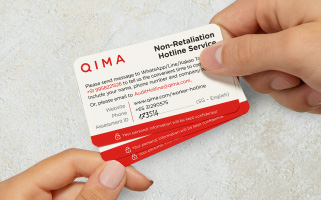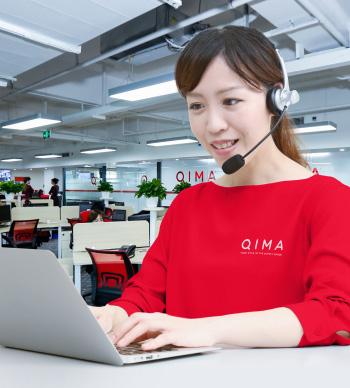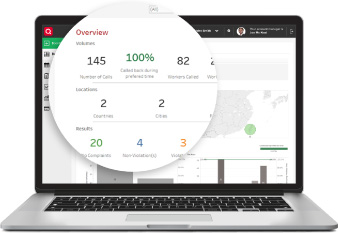Worker Hotline, Anti-Retaliation Callback Service and Worker Voice Surveys
Worker interviews are an important part of a supplier audit to provide a complete picture of the factory’s operations. However, workers may be hesitant to share any issues with their working conditions while on-site at the factory, or they may face retaliation and negative consequences imposed by the factory’s management if they are seen to report issues or complaints.
Our Worker Hotline, proactive Anti-Retaliation Callback Service, and Worker Voice Surveys provides a confidential channel for interviewed workers to report any coercion, negative outcomes that occur as a result of their involvement in the audit, or complaints that they may not have been comfortable sharing with the auditor on-site.
Worker Hotline
During a supplier audit, workers may feel they want to share additional information even after the audit has been completed. There are situations when workers may feel uncomfortable reporting problems to the auditors in the factory: for example, if they have reason to believe that the factory management may penalize them.

Our Worker Hotline is a safe and confidential channel that provides a direct line for workers to share their complaints with the end buyer of the products they make.
Workers are given a hotline card during the interview which states the various contact methods (telephone, QQ, WeChat, WhatsApp, Line, Viber, email etc.). Our phone numbers are local or toll-free numbers in the countries covered (China, India, Indonesia, Vietnam, Malaysia, Japan, Korea, Philippines, Thailand).
If a worker calls, they will be able to talk to a real person from QIMA in their own language.
Any reports made through the Worker Hotline will stay confidential and the worker’s name will not be shared with the factory management. They will however be passed on to the auditor and end buyer to provide a full and transparent picture of what is going on at the factory, and to help create a better working environment.
Anti-Retaliation Callback Service
A concern when carrying out an audit is that factory management may punish a worker in some way for providing honest feedback on their working conditions. Our Anti-Retaliation Callback Service is designed to uncover any such occurrences to ensure worker safety and provide a complete picture of the working environment.
Our Anti-Retaliation Callback Service operates as follows:
-
Communication During the Audit
The auditor informs factory management that a hotline card will be given to workers during their interviews and that workers will receive a phone call to follow-up and ensure there was no retaliation.
During the worker interviews, our auditor distributes a hotline card and explains to the worker that they will also receive a confidential callback after the audit is completed. The auditor asks for their phone number, preferred time to call (e.g. weekend, evening, lunch break) and preferred language for the call. The worker is also informed of the QIMA Worker Hotline number to call if they encounter any problems.
-
Upon Completion of the Audit
We call the interviewed workers at their preferred time, within a specified time period after the audit (for example, 10 days).
Calling models can be adapted to your specifications. For example, we can provide unlimited calling until success or asked to not call again, or a maximum number of call attempts to one person (e.g. 2 attempts).
-
During the Call
Our callers speak in the worker’s language, and can cover multiple local languages as needed in the countries covered (for example, in Malaysia our callers cover Bahasa Malaysia, Thai, three dialects of Indian language and English).
We follow a script and ask a series of pre-determined questions, as well as open-ended questions to see if the worker has any other complaints they would like to report. Detailed responses are recorded, to be passed back to you.

A standard sample list of questions asked by the caller during the phone interview includes:
- Did anyone in the facility management help you prepare for the audit interview?
- Did anyone in the facility management help you prepare any records for the audit such as your job application, pay or attendance records?
- Following the audit, were you terminated form your job for an unwarranted reason?
- Following the audit, were you subjected to any unwarranted disciplinary actions?
- Following the audit were your wages/benefits reduced for unwarranted reason?
- Following the audit were your work responsibilities reduced for unwarranted reason?
- After the audit interview, did anyone in management make you reveal the questions asked and your answers?
- Is there any other complaint you have regarding the facility or management you would like to share now?
-
Following the Callbacks

Results of the callbacks are viewable in an anonymous dashboard that does not show any worker names or contact information to ensure utmost confidentiality.
The dashboard shows:
- An overview of call volumes and success rates
- Call results including number and details of complaints and violations
- Call quality monitoring factors such as call length
- Results broken down by supplier or factory
Worker Voice Surveys
To make worker voice heard across global supply chains, QIMA has partnered with Ulula, a North America based social enterprise that equips organizations with technology, data and analytics to monitor risks of human rights abuses in order to create more responsible supply chains.

By integrating Ulula's solutions with QIMA on-site audits, we provide workers with a safe and effective mechanism for reporting any relevant information about their workplace, both reactively and proactively.
An example of a reactive report would be an account of abuse and threat in the workplace, or a violation of human rights, such as restriction of freedom or withholding of passports. By contrast, when acting proactively, a worker could report a perceived structural risk so it can be addressed before it’s exacerbated.
Ulula worker voice survey results are integrated into, and correlated with QIMA’s audit reports, giving you a comprehensive picture of your factories’ continuous improvement, which provides an additional degree of objectivity compared to a one-off spot check.
Why Use the Worker Hotline, Anti-Retaliation Callback Service and Worker Voice Surveys
- Provide a channel for workers to report issues safely, confidentially and at a time that suits them
- Gain a complete and transparent picture of conditions at your factories, beyond the initial audit
- Ensure the safety and job security of workers at your factories

